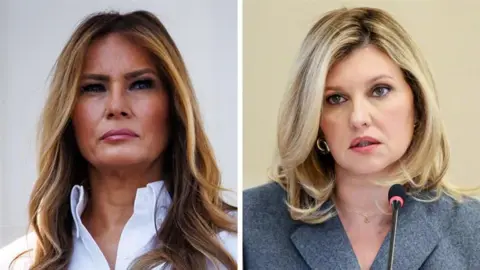In a poignant episode highlighting the intersection of empathy and international diplomacy, Ukraine’s First Lady, Olena Zelenska, recently communicated with Melania Trump through a letter of gratitude. This exchange occurred during a significant face-to-face meeting between Ukrainian President Volodymyr Zelensky and former U.S. President Donald Trump in the Oval Office. The letter particularly praised Melania Trump for her advocacy regarding the plight of Ukrainian children, over 19,500 of whom have reportedly been abducted by Russian forces since the escalation of the conflict in 2022.
During the meeting, President Zelensky articulated the critical role that Melania’s awareness-raising efforts played in addressing the distressing issue of child abductions resulting from the ongoing war. He remarked that the correspondence was not merely ceremonial, but indeed a reflection of compassion for a deeply troubling humanitarian crisis. Zelenska’s commendation of Melania’s previous outreach to Russian President Vladimir Putin further underscores the urgency surrounding the situation. In her letter to Putin, she implored him to consider the well-being of these children, reminding him that prioritizing their innocence serves humanity as a whole, not just Russia.
Melania Trump, through her empathetic outreach, emphasized a universal sentiment: the innate desire of all children to feel safe and loved. Her letter eloquently expressed a desire for harmony, beckoning Putin to recognize that he has the power to “restore their melodic laughter,” highlighting the stark reality faced by many children caught in the crossfire of conflict. When pressed about Melania’s sentiments concerning these issues, former President Trump supported her perspective, emphasizing her deep concern for children affected by war, thereby framing Melania’s advocacy within the larger narrative of humanitarian crises.
Zelensky’s praise for Melania was not only an acknowledgment of her efforts but also served as a potent reminder of the war’s far-reaching impacts. He stated that her attentiveness to the issue reflects the heart-wrenching reality faced by countless families in Ukraine—a reality marked by the pain of separation and loss. The ongoing abduction of children during the conflict highlights the humanitarian tragedy that resonates within the broader context of Ukraine’s fight against aggression.
The Ukrainian government claims that approximately 19,500 children have been forcibly relocated or deported to Russia or areas under Russian control, with around 1,500 having been successfully returned. In light of these grim statistics, international bodies such as the International Criminal Court have issued arrest warrants against key Russian officials for their alleged involvement in these unlawful kidnappings, emphasizing the gravity of the situation. Russia, however, counters these claims, asserting that it is acting in the best interest of the children by relocating them away from war-torn areas.
The issue of abducted children emerged as a focal point of discussion during a subsequent meeting in the White House, which involved President Zelensky and several European leaders. The European Commission President, Ursula Von der Leyen, expressed a resolute commitment to the cause of reunifying abducted Ukrainian children with their families, emphasizing that the human cost of war is unacceptable. Her statements encapsulated a growing international awareness and urgency regarding this issue.
Public sentiment in Ukraine is also reflective of the emotional burden carried by families impacted by these abductions. Citizens like Valerii Krut, a grandfather and advocate, articulated the pervasive grief felt across the nation, asserting that the abduction of children has left many families fragmented and traumatized. A student named Sofia Muravytska expressed hope that the dialogue between the two first ladies symbolizes progress—an acknowledgment of the significant challenges faced by Ukraine’s youth amidst the ongoing crisis.
Thus, the dialogue spurred by these letters between Olena Zelenska and Melania Trump transcends mere diplomatic gestures. It reflects a concerted effort to bring attention to the humanitarian implications of war, shining a light on the innocence of children caught in geopolitical conflicts. Such communication can serve as a catalyst for broader conversations about peace and reparation, underscoring a universal quest for compassion and resolution in times of strife.












